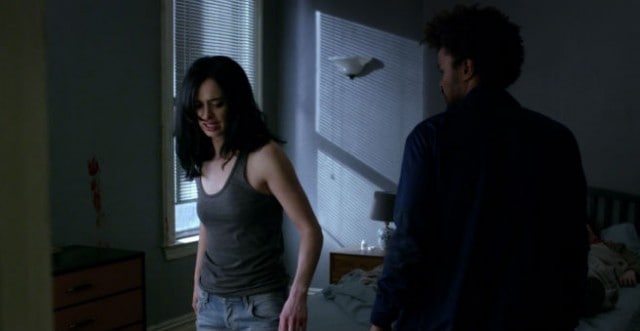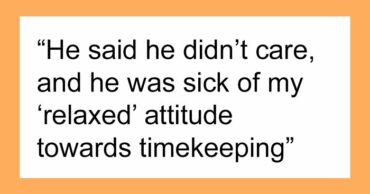
For six episodes, Jessica Jones has watched its titular character struggle to find her identity again, rebuilding her life in the aftermath of Kilgrave’s influence over her. “AKA You’re a Winner” finally brought to light what that inner turmoil really was: guilt over killing Luke’s wife, leading Jessica down a road of self-loathing and punishment that led to the explosive scene between her, Luke, and one very unfortunate city bus. That scene, where Luke voices the very thing Jessica fears the most about herself, finally felt like Jessica Jones digging into the heart of its story, and as a result, “AKA Top Shelf Perverts” is free from the constraints of previous episodes, able to push the overarching plot forward while finally digging its nails into the existential crisis Jessica is facing.
Of course, this is also the hour where Kilgrave makes his grand entrance as the season’s big villain; he’s existed on the fringes of the season thus far, he’s been more of a psychological presence than a physical one. In “Top Shelf,” he makes his arrival in a big way, buying Jessica’s childhood home and forcing poor, weird Reuben to commit suicide in her bed before showing up at the precinct for a theatrical declaration of love. But “Top Shelf” is less about Kilgrave’s ever-growing presence in the story than it is Jessica’s horrible plan to try and snare him in a trap, and both stories work to the same end in detailing the deeper levels of emotional turmoil Jessica’s been dealing with – in turn making “Top Shelf Perverts” a tighter, more direct episode than the wandering, noir-ish hours preceding it.
There are other stories on the fringes – Trish and Will are getting a little more forceful during coitus, and Jessica’s making her boss’ divorce very difficult – but Jessica’s emotional plight is really the focal point of the episode, and deservedly so, capturing the thought process of a victim in evocative ways, both literally and figuratively. The entire hour is crafted around Jessica trying to put herself in the most secure physical prison she possibly can, in order to trap Kilgrave when he’d inevitably come to find her. What she doesn’t realize is how Kilgrave’s already placed her in that prison psychologically, with the daily selfies, murdering, and well-detailed mind control he had her under. Her obsession with him has mirrored his obsession with her, and the more and more depraved Kilgrave’s attempts to profess his love become, the more desperate Jessica’s attempts to prevent his influence are. Yet all she’s doing is isolating herself even further, proving his influence on her is stronger than ever. Even the strong wills of her best friends aren’t enough to change that, as this hour bears out.
Where it pushes Jessica to is a frightening place. Although I fully expect her to turn the tables on Kilgrave now that she’s in her childhood home with him, the effects of Stockholm syndrome are fully apparent in her treatment of him. Instead of just murder-punching him in the police department, she feels responsible for everything he’s done to her, and takes it upon herself to “finish” it – but first, she’s going to learn about why he is who he is. Her loss of identity isn’t going to be solved by her childhood diary – but she has that, and can at least look at the events and thoughts of her young self and know how her experiences shaped her. She doesn’t have that same information on Kilgrave, and it’s probably what will let her destroy him. Drugs won’t work, confessing to murder won’t work, so the only way to deal with him is, like he did with her, learn about who he was, and what makes him the man he is today (her exercises in remembering her childhood streets turn out to be a very carefully dropped clue, in this regard). Jessica may not love Kilgrave, but she’s trying to understand him, and that part of the victim process is uncomfortable as hell to watch, wonderfully captured by writers Jenna Reback and Micah Schraft in those final moments.
Increasingly, I’ve wondered whether Jessica Jones had a story to tell outside of Jessica’s experiences with men, depicting both ends of the sexual spectrum (that is, true love and rape), and I’m sure there are scenes of this show that fail the Bechdel test on numerous levels. But “AKA Top Shelf Perverts,” with the flashbacks into Jessica’s childhood and the depiction of her friends coming together to help her (even when she’s being an insufferable lunkhead), offer Jessica Jones something more than doomed romantic entanglings and a woman defining her life by her attacker’s behavior as drives for its narrative, even as it brings the unstable creep fest known as Kilgrave closer to the show’s main characters and activities. It’s not necessarily a fix-all for the show, but refocusing itself on Jessica’s sense of self-worth gives this episode some extra punch in its most dramatic moments, potentially establishing itself as a true turning point for the show’s first season.
Other thoughts/observations:
- Bye, Luke! See you in 2016!
- Robin calls Malcolm Q-Tip for some reason; why does she need to be casually racist, as well as borderline incestual?
- Apparently Trish’s mother let her turn into a drug addict as a teenager, then brought in Jessica as a “strategic plague” to further embellish the situation? Weird.
- “This one deserves a last, lingering look.” Boy, do I love when Jessica Jones dives deep into the jazz-and-booze stained end of the noir playbook.
- “I’m still not the hero you wanted me to be.”
[Photo via Netflix]
 Follow Us
Follow Us





